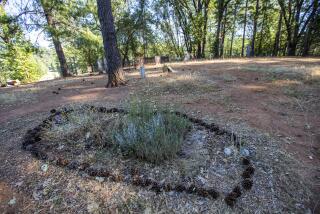GARDEN GROVE : Dealing With the Dead for a Living
- Share via
Florence Alvarez, 17, didn’t know much about embalming a few days ago but now wants to try it as a career.
“It sounds really exciting. It’s something I’d like to go into, definitely,” she said on Friday.
Florence was one of 20 Bolsa Grande High School students who attended a career opportunity seminar designed to offer a glimpse of jobs related to mortuary sciences, including funeral directors, coroners and forensic pathologists.
Some of her classmates were less enthusiastic about a job that deals so much with cadavers. But Florence said: “I don’t think it’s gross. That’s life.”
Ron Kilgore, 22, a mortuary sciences student at Cypress College preparing to become a licensed embalmer, delivered the lecture about how dealing with death can be a rewarding way to make a living.
Standing next to a skeleton sporting a red rose on its rib cage--where a human heart once nested--Kilgore emphasized that the job is as much about comforting grieving relatives as preparing bodies for burial. “You have personal satisfaction” from offering help to families when they need it the most, he said.
Wearing the black suit, pants and dark tie traditionally associated with funeral directors, he asked what images came to mind when they thought about funeral directors.
“Gross,” said one student.
“Dead person,” said another.
“I just imagine someone in a black suit--like you,” added a third.
Kilgore said that his interest in law enforcement and homicide investigation lead him to mortuary science. Although he initially wanted a career as a police officer, he changed his mind because being an embalmer “was a lot safer.”
“I didn’t like the idea of not knowing whether I would come home in one piece or come home alive,” Kilgore said.
A student asked if Kilgore suffers emotional stress as a result of working with dead bodies.
“It’s hard not to,” he said. “When I first started, I would get depressed and cry.” Especially difficult were the cases which involved infants.
Describing embalming as a process that hampers decomposition of the body, Kilgore displayed glass bottles containing different types of embalming fluids and explained their uses.
Embalmers drain body fluids from the body and inject liquids such as formaldehyde to slow the process of deterioration.
The students listened quietly, occasionally asking questions about pay, job hours and rewards.
“One of my goals was to show them that how we’re not just weird guys sitting in the corner,” Kilgore said. “It’s not a gory job.”
Tuyet Huynh, 17, called the seminar “very fascinating” but added: “I can’t face that emotionally--just looking at those bodies.”
Tomi Cook, 17, was more receptive. “Before, I thought it was gross,” she said. “But it’s just different than other occupations. You get to help people.”
More to Read
Sign up for Essential California
The most important California stories and recommendations in your inbox every morning.
You may occasionally receive promotional content from the Los Angeles Times.













